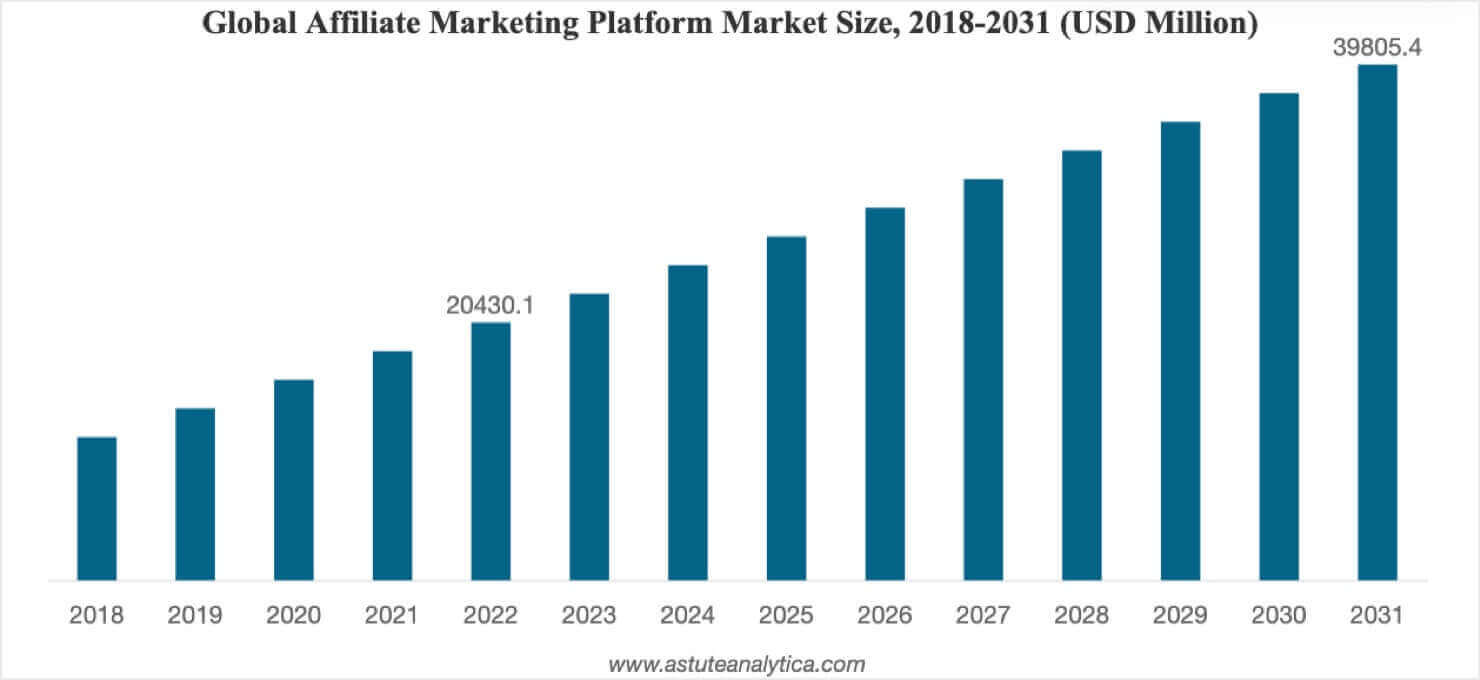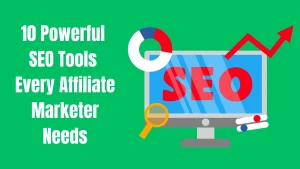Should You Start Affiliate Marketing in 2025? 8 Things You Need to know

Affiliate marketing has come a long way since its early days. Back then, it was a simple concept: promote someone else’s product and earn a commission on sales.
Over the years, it’s grown into a sophisticated industry, with marketers using advanced strategies to reach wider audiences.
In 2025, affiliate marketing is more dynamic than ever. The global affiliate marketing industry is valued at over $17 billion and is expected to grow to $27.78 billion by 2027. This growth presents both opportunities and challenges for newcomers.
However, it’s not all smooth sailing. This sector is becoming increasingly competitive, with more marketers and influencers entering the field.
This saturation makes it harder to stand out and requires more innovative approaches to capture the audience’s attention.
Moreover, legal challenges are emerging. For instance, influencers are suing companies like Capital One, alleging that their browser extensions “stole” affiliate commissions by replacing original tracking cookies. These disputes highlight the complexities and potential pitfalls in the affiliate marketing space.
In this article, we’ll explore eight crucial aspects of starting affiliate marketing in 2025. From understanding current trends to navigating legal issues, you’ll gain insights to help you decide if this path aligns with your goals.
Key Takeaways
- Affiliate marketing is still growing: The industry is expanding, with more brands investing in partnerships. There’s money to be made, but competition is increasing.
- SEO and content quality matter more than ever: Search engines favor helpful, original content. Simply stuffing keywords won’t work—you need to provide real value.
- AI tools can speed things up, but strategy wins: AI can help with research and content creation, but success still depends on a solid niche, a marketing plan, and consistency.
- Regulations are tightening: Governments are enforcing stricter disclosure rules, and platforms are cracking down on shady tactics. Staying compliant is non-negotiable.
- Diversification is key: Relying on one platform or traffic source is risky. Smart affiliates build multiple income streams through blogs, social media, and email lists.
- Trust and authenticity drive conversions: People see through aggressive sales tactics. Personal recommendations, honest reviews, and transparency will set you apart.
- Patience is required: Affiliate marketing isn’t a quick cash grab. It takes time to build traffic, establish credibility, and start earning consistently.
Things You Need to Know Before Starting Affiliate Marketing in 2025
Now, these are the things you need to know to stay ahead, increase profits, and avoid common mistakes.
1. The Growth of Affiliate Marketing in 2025
Affiliate marketing keeps getting bigger. As I mentioned above, in 2025, the industry is valued at over $17 billion and is set to hit nearly $28 billion by 2027. More brands are turning to affiliates because it works—it’s a low-risk way to drive sales.

But here’s the thing: growth means more competition. Getting into affiliate marketing now still makes sense, but you can’t just throw up a website and expect passive income. The days of quick wins are gone. You need a smart strategy, quality content, and patience.
New opportunities are popping up. Health and wellness are booming, covering everything from mental health apps to fitness gear. AI tools and automation software are also hot. Voice search is changing how people find information, creating fresh angles for affiliate marketers to explore.
From what I’ve seen, adaptability is everything. The ones who thrive don’t just chase trends—they stay ahead of them. If you want to make money with affiliate marketing in 2025, you’ll need to focus on what works now, not what worked five years ago.
2. Is Affiliate Marketing Still Profitable in 2025?
Short answer—yes. But it’s not a magic money machine. You need the right strategy, realistic expectations, and patience. Let’s break it down.
Commission Structures: What to Expect
Affiliate commissions vary based on the program. Some pay a percentage, others a flat rate. Here’s what I’ve learned from experience:
- High-ticket programs: You earn $100 to $1,000+ per sale, but conversions take more effort. These work best for marketers who know how to sell.
- Low-ticket programs: Payouts range from $1 to $20 per sale. They’re easier to sell, but you need high volume to make real money.
I’ve seen most people burn out chasing big commissions without a solid strategy. Others waste time pushing low-ticket products that barely move the needle. Success comes from knowing your audience and balancing both.
Also Read: Understanding the Affiliate Commission Structure: What It Is and How It Works
High vs. Low-Ticket Affiliate Programs: Which One Works Best?
It depends on your approach.
- If you want fast wins, low-ticket products get quick conversions. But the profits are small.
- If you prefer fewer, bigger payouts, high-ticket programs offer larger commissions. The downside? More trust-building, longer sales cycles.
I’ve done both. When I started, low-ticket gave me quick motivation. But over time, I realized high-ticket sales made more sense. Now, I use a mix—low-ticket for steady income, high-ticket for profit spikes.
Realistic Earnings Expectations
Forget the hype. Affiliate marketing pays, but not overnight. Here’s what you can expect:
- Beginners: $0–$1,000/month (learning phase).
- Intermediate: $1,000–$10,000/month (consistent effort starts paying off).
- Advanced: $10,000–$100,000+/month (well-built systems, strong audience, and multiple income streams).
I won’t sugarcoat it. If you think slapping links online will make you rich, you’ll be disappointed. But if you build trust, create value, and stick with it, affiliate marketing can be life-changing.
My Take
I’ve witnessed a lot of people (including my closest friends and family) quit too soon because they expected instant results. Others doubled down, adapted, and built solid income streams. The ones who succeed don’t just chase commissions—they solve problems, provide value, and play the long game.
So, is affiliate marketing still profitable in 2025? Absolutely. But only for those willing to treat it like a real business.
3. Competition & Market Saturation in 2025: Should You Be Worried?
Affiliate marketing is more crowded than before, but that doesn’t mean there’s no room to grow. The real challenge is not competition—it’s standing out and being unique.
If you pick the right niche and build real authority, you won’t struggle. Let’s break it down.
Has the Market Become Too Crowded?
Yes and no. There are more affiliates than ever, but most don’t put in the work. Actually, only 4% of all affiliate marketers become successful. Many just copy what others do, rely on spammy tactics, or quit after a few months. That’s where opportunity comes in.
People still search for products, still need recommendations, and still want real insights. The key is to stop chasing broad, oversaturated topics and start positioning yourself as a trusted voice in a specific space.
How to Find Untapped Niches
Big niches like fitness, finance, and tech have tons of competition, but they also have gaps. The trick is to go deeper. Instead of “weight loss,” focus on “weight loss for busy parents.” Instead of “personal finance,” go for “budgeting for freelancers.”
Here’s how I find hidden opportunities:
- Look for underserved audiences: Who isn’t being targeted? What problems aren’t being solved?
- Check social media discussions: Facebook groups, Reddit, and forums reveal what people struggle with.
- Analyze search trends: Tools like Google Trends and AnswerThePublic help spot growing topics.
- Test ideas: Start small. Create content on a niche topic and see if it gains traction.
I once wrote a blog post on a niche WordPress plugin that barely had competition. That single post brought in commissions for months. That’s the power of finding gaps.
Strategies to Stand Out from Competitors
Even in a crowded niche, you can win by doing what others ignore. As I said, be unique in your own way. Here’s what works:
- Be more helpful: Answer questions in detail. Offer insights others don’t.
- Share personal experiences: People trust real stories over generic advice.
- Create better content: Most affiliates push the same recycled info. Make yours more useful and engaging.
- Go beyond blog posts: Try videos, podcasts, or newsletters. The more ways people can find you, the better.
- Build an audience: Don’t just rely on search traffic. Grow an email list or a social following.
The biggest mistake? Trying to compete with big sites on broad keywords. Instead, find your angle, go deep, and offer something others can’t.
My Take
Yes, competition is tough. But most affiliates aren’t willing to do what it takes. If you focus on providing real value, there’s still plenty of room to succeed.
Struggling to Find a Profitable Niche? Stop guessing and start earning. Niche Navigator walks you through a proven system to uncover money-making niches in just one hour. No more wasted time or dead-end ideas—just a clear path to a niche that works.
4. Best Platforms & Networks in 2025
Affiliate marketing success depends on working with the right networks. Some platforms offer higher commissions, while others have better product variety. Picking the right one can mean the difference between steady earnings and constant frustration.
Top Affiliate Programs Worth Considering
Some networks have been around for years and still perform well. Here are a few solid options:
- Amazon Associates: Great for beginners, but commissions are low. Works well if you focus on volume.
- ShareASale: A trusted marketplace with a mix of physical and digital products.
- Impact: Popular with big brands and offers high payouts in some niches.
- CJ Affiliate (Commission Junction): Well-established and connects you with major retailers.
- ClickBank: Mostly digital products with high commissions, but quality varies.
- Rakuten Advertising: Works best if you target international markets.
Continue Reading: 15 Best Affiliate Networks That Actually Pay
How to Pick the Right Network
Not all networks fit every niche. I’ve personally tested several and learned that choosing the right one depends on:
- Your niche: Some networks cater to physical products, while others focus on digital ones.
- Commission rates: A 3% payout won’t cut it if you’re selling low-cost products.
- Payout terms: Some networks pay monthly, others take longer. Read the fine print.
- Ease of approval: Some networks require a high-traffic site, while others accept new affiliates.
If you’re just starting, go for beginner-friendly platforms like Amazon Associates or ShareASale. If you have experience and traffic, Impact and CJ Affiliate are worth exploring.
Here’s how to choose the best affiliate program
New & Emerging Platforms
Affiliate marketing is always evolving. Here are some platforms that are gaining attention:
- Lemonade Finance Affiliate Program – Growing in the fintech space.
- PartnerStack – Focuses on SaaS and B2B partnerships.
- Etsy Affiliate Program – Great for niche audiences interested in handmade or vintage products.
- Temu Affiliate Program – New but offers high commissions for product promotions.
The right platform depends on your niche and how you promote offers. If one network isn’t working, test another. The key is to align your strategy with the best opportunities available.
5. SEO & Content Strategies for Success
SEO drives consistent traffic. Paid ads come and go, but organic traffic builds long-term income. If you want stability, SEO matters.
Why Organic Traffic Wins
Affiliate marketing works best when people find your content naturally. Organic visitors trust recommendations more than ads. A well-optimized blog post can bring in sales for years. Compare that to paid ads, which stop working the moment you stop paying.
Google rewards helpful content. That means writing for people, not just search engines. Use keywords naturally. Answer real questions. If your content is useful, it ranks better.
Also Read: Why Valuable Content Wins in Affiliate Marketing (And How to Create It)
Blogging vs. YouTube vs. Social Media
Each platform has strengths. The best one depends on how you create content.
- Blogging – Best for SEO and long-term traffic. Written guides and reviews work well.
- YouTube – Great for product demonstrations and trust-building. Some niches work better on video.
- Social Media – Quick engagement but short lifespan. TikTok, Instagram, and Twitter can drive traffic, but it’s not as steady.
I prefer blogging because it compounds over time. A good article from a year ago can still make money today. YouTube works well, too, but video takes more effort. Social media can boost traffic, but it’s unreliable.
How to Create Evergreen Content That Drives Passive Income
Evergreen content stays relevant over time. It’s not tied to trends or news. Good evergreen content:
- Solves a problem people always have.
- Uses keywords with long-term demand.
- Gets updated when needed to stay fresh.
I always check if a topic will still be useful a year from now. If not, I skip it. The goal is to create assets that keep earning, not posts that die in weeks.
Keyword Research & SEO Best Practices in 2025
SEO changes, but the basics stay the same. Good content wins. Here’s how I approach keyword research:
- Find high-demand, low-competition keywords. Tools like KWFinder and Google Keyword Planner help.
- Use AI tools wisely. I check AI-generated keyword suggestions but filter them based on my experience.
- Go beyond keywords. Google looks at relevance, user intent, and expertise. Writing naturally matters more than stuffing keywords.
For best results:
- Write for people first, then optimize. Google rewards useful content, not robotic SEO tricks.
- Use structured data. FAQs, tables, and bullet points help Google understand content better.
- Get backlinks. Authority still matters. Links from trusted sites help content rank faster.
In Summary
SEO builds a business that runs on autopilot. A well-optimized article can bring in steady traffic for years. Paid ads stop working once the budget runs out, but SEO keeps delivering.
Blogging gives control, YouTube builds trust, and social media drives quick bursts of traffic. The key to lasting success is evergreen content—guides, tutorials, and solutions people will always need. Strong keyword research and well-structured content keep it relevant.
It’s not about chasing trends but creating assets that work long after publishing. SEO takes patience, but the long-term rewards make it worth the effort.
Want your website on page one? “3 Months to No.1“ lays out a straightforward, step-by-step SEO strategy that actually works. Get clear actions to help you rank higher and get more traffic.
6. The Role of AI & Automation in Affiliate Marketing
AI makes affiliate marketing easier but not effortless. It speeds things up, but it won’t replace real expertise. If you use it right, it helps create content, automate marketing, and improve SEO.

AI-Driven Content Creation & Automation
AI tools like ChatGPT and SEOwind can generate articles, emails, and social media posts in minutes. Sounds great, right? But raw AI content feels generic. Google values real experience, so I never publish AI-written text without adding my insights.
Here’s how I use AI without sounding robotic:
- Brainstorming topics – Helps when I need fresh content ideas.
- Outlining articles – Speeds up structure planning.
- Generating drafts – Good for getting started, but I always rewrite sections to add personality.
AI-generated content alone won’t rank well. Google favors real expertise. If you rely too much on automation, your content will feel empty.
The key is balance—use AI for speed but add your personal touch. I’ve tested AI-generated blog posts, and they never perform as well as human-written ones. AI should assist, not replace.
Must Read: 9 Best Free AI Writing Tools Every Affiliate Marketer Should Try
Chatbots & Automated Funnels
Chatbots save time. They handle FAQs, qualify leads, and collect emails 24/7. I use them on landing pages and in DMs to warm up potential buyers (Here is my favorite chatbot).
Email automation is another must. A well-set sequence keeps leads engaged without constant effort. Once someone signs up, they should get:
- A welcome email with value upfront.
- Follow-ups with useful content before pitching anything.
- A strong offer at the right time.
The goal is to keep people interested without annoying them. Set it up once, then let automation do the work.
AI-Powered SEO & Analytics
AI tools like Surfer SEO and Clearscope make ranking easier by suggesting keywords and structure. I use them to refine my content, but I never follow them blindly. Sometimes, what works best goes against the “recommended” structure.
Analytics tools powered by AI help track performance. Google Analytics, Ahrefs, and similar platforms now predict trends and highlight what’s working. But AI can’t tell you why a post ranks—it just gives data. That’s where experience matters.
AI is a tool, not a replacement. It speeds up processes, but success still depends on human insight. If you mix automation with real strategy, you stay ahead.
7. Compliance & Legal Considerations in Affiliate Marketing
Affiliate marketing comes with legal responsibilities. Ignoring them can lead to fines or lost trust. Every affiliate needs to understand disclosure rules, data privacy laws, and ethical marketing standards.
FTC Guidelines for Affiliate Disclosures
If you promote a product and earn a commission, you must tell your audience. The FTC (Federal Trade Commission) requires clear and upfront disclosures.
Saying “This post contains affiliate links” in fine print at the bottom isn’t enough. It should be obvious and placed near the link or recommendation. Simple phrases like “I may earn a commission if you buy through this link” work.
Like this:

Avoid vague language or hiding disclosures on a disclaimer page. Transparency builds trust and keeps you compliant.
Must Read: How to Disclose Affiliate Links Transparently and Build Loyal Audiences
GDPR and Data Privacy Regulations
If you collect user data, even through cookies, you need to follow data privacy laws like GDPR (General Data Protection Regulation) and CCPA (California Consumer Privacy Act). These laws require:
- User consent before collecting personal data.
- An easy way to opt out of data tracking.
- A privacy policy explaining how data is collected and used.
Many affiliate networks use tracking cookies. If your website or email marketing collects data, you must inform users. A simple cookie consent banner can keep you on the right side of the law.
Ethical Affiliate Marketing Practices
Compliance isn’t just about avoiding fines. It’s about marketing honestly. Pushing bad products for high commissions is a short-term game.
Misleading claims, fake reviews, and aggressive tactics might bring quick wins but destroy credibility. The best approach? Only recommend products you’d use yourself and give an honest review of their pros and cons.
Readers appreciate honesty, and brands prefer affiliates who drive real, informed buyers.
Finally, affiliate marketing works best when it’s transparent and ethical. Following the rules keeps your business safe and your audience loyal.
A trustworthy affiliate is one people return to—because they know they’re getting real advice, not just a sales pitch.
8. How to Get Started in 2025
I’ve been in affiliate marketing long enough to know one thing—most people fail because they overcomplicate it.
They jump between niches, chase every shiny object, and quit when things don’t take off overnight. The truth? Success comes from a simple, focused approach. Let me break it down.
(a). Pick a Niche That Actually Works
Don’t pick something just because it sounds profitable. Choose a niche where people are actively searching for solutions. But don’t go too broad—find a sub-niche where you can stand out.
Instead of “fitness,” focus on “strength training for beginners.” Instead of “tech,” go for “budget-friendly laptops for students.” The goal is to be the go-to source for a specific audience.
Also Read: How to Choose the Best Niche for Your Affiliate Marketing Business
(b). Get Your Website Up Fast
A website gives you control over your business. Buy a domain, set up hosting, and install WordPress. Keep the design clean and professional—no clutter, no distractions.
Fast-loading pages and mobile-friendly layouts matter more than fancy designs.
(c). Write Content People Actually Search For
Don’t guess what to write. Use keyword research tools to find what people are searching for, then create content that answers their questions.
Focus on evergreen topics that stay relevant. A mix of in-depth guides, product reviews, and comparison posts works best.
(d). Get Traffic Without Relying on Luck
SEO is the long game, but it pays off. Use long-tail keywords to rank faster. Promote your content on social media, but don’t depend on it.
Email marketing helps turn visitors into loyal readers. The key is consistency. Stick to a schedule and keep publishing.
Also Read: How to Drive Organic Traffic to Your Affiliate Links Using Long-Tail Keywords
(e). Monetize the Smart Way
Not all affiliate programs are equal. Some pay peanuts, while others offer real income potential. Choose offers that match your audience.
High-ticket products bring bigger commissions, but lower-cost items sell more often. A mix of both keeps earnings steady.
(f). Track, Test, and Adjust
Affiliate marketing isn’t set-and-forget. Check your data—see what’s working and what’s not. Use Google Search Console, heatmaps, and affiliate dashboards to track performance.
If something flops, tweak it. If something works, double down.
Most people give up too soon. The ones who succeed are the ones who stay consistent, keep learning, and put their audience first. If you do that, the results will come.
Conclusion
Affiliate marketing in 2025 is still worth it—but only if you approach it the right way. The days of easy money are gone. Success now requires strategy, patience, and real value. If you’re willing to pick a solid niche, create useful content, and drive targeted traffic, there’s still plenty of opportunity.
The most important thing is taking action. Many people spend months researching and never get started. Others dive in, learn from mistakes, and build something profitable.
If you’re serious about making money online, affiliate marketing remains one of the best ways to do it. The only question is: Will you start?
Frequently Asked Questions
Can beginners still make money with affiliate marketing in 2025?
Yes, but it takes effort. The competition is higher, so you need to pick a smart niche, create high-quality content, and drive traffic consistently. Quick wins are rare, but those who stay consistent can still earn well.
How much does it cost to start affiliate marketing?
It depends on your approach. A basic website costs around $50–$100 per year. If you use free traffic methods like SEO or social media, your main investment is time. Paid ads can speed things up, but they require a bigger budget.
How long does it take to start making money?
Most people take 3–6 months to see their first commission. Success depends on your niche, traffic strategy, and content quality. Some earn faster by using paid traffic, but organic growth usually takes longer.
What’s the best way to drive traffic to an affiliate site?
SEO, YouTube, and social media work well. Blogging and YouTube bring long-term results, while platforms like TikTok or Instagram can drive faster traffic. The key is consistency and targeting the right audience.
Do I need a website to start affiliate marketing?
No, but it helps. A website gives you control over your content and long-term stability. You can also use social media, email marketing, or YouTube, but a website makes scaling easier.







Practical advice, always appreciate posts that simplify the process.
Hi there to all, for the reason that I am genuinely keen of reading this website’s post to be updated on a regular basis. It carries pleasant stuff.